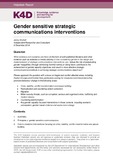| dc.contributor.author | Birchall, Jenny | |
| dc.date.accessioned | 2019-01-11T10:48:20Z | |
| dc.date.available | 2019-01-11T10:48:20Z | |
| dc.date.issued | 2018-12-06 | |
| dc.identifier.citation | Birchall, J. (2018). Gender sensitive strategic communications interventions. K4D Helpdesk Report. Brighton, UK: Institute of Development Studies | en |
| dc.identifier.uri | https://opendocs.ids.ac.uk/opendocs/handle/20.500.12413/14265 | |
| dc.description.abstract | It is possible to find some examples of good practice around gender in communications interventions focusing on the majority of sub-themes set out in the research question. There are four key points emerging from the evidence discussed in this rapid review. First, gender equality focused interventions with objectives to change social norms and tackle violence and discrimination against women and girls were most successful when they encompassed both communication and non-communication activities; worked with a range of stakeholders, including men and boys and community and religious leaders; and when they provided opportunities for peer learning, discussion and mobilisation. Second, some non-gender focused interventions were successful in promoting gender equality because they thought about differences in women and men’s access to and use of technology at the design and planning stage. Others were successful because they recognised that in some cases women and girls may be prevented from taking part in or benefiting from activities because of environmental factors, caring responsibilities or gendered attitudes, norms and stereotypes. Therefore, they provided extra enabling factors to encourage women’s participation. Third, in some examples, where gender was not thought about in the planning of the intervention (it was designed in a gender-neutral way), or gender was considered, but in a way that reinforced stereotypes (for example targeting women solely as mothers), the initiative did not have positive gender equality impacts, and risked reinforcing inequalities. Fourth, some initiatives built on, and engaged with, changes in gender roles that were already occurring in fragile or conflict affected settings, providing a forum for discussion about these changes and strong, positive role models for female listeners to draw strength from. | en |
| dc.language.iso | en | en |
| dc.publisher | IDS | en |
| dc.relation.ispartofseries | K4D Helpdesk Report;498 | |
| dc.rights.uri | https://www.nationalarchives.gov.uk/doc/open-government-licence/version/3/ | en |
| dc.subject | Gender | en |
| dc.subject | Rights | en |
| dc.subject | Security and Conflict | en |
| dc.subject | Social Protection | en |
| dc.title | Gender Sensitive Strategic Communications Interventions | en |
| dc.type | Helpdesk | en |
| dc.rights.holder | © DFID - Crown copyright 2018. | en |
| dcterms.dateAccepted | 2018-12-06 | |
| rioxxterms.funder | Department for International Development, UK Government | en |
| rioxxterms.identifier.project | K4D | en |
| rioxxterms.version | VoR | en |
| rioxxterms.funder.project | 238a9fa4-fe4a-4380-996b-995f33607ba0 | en |

